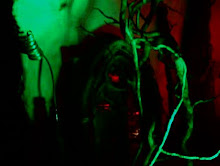Part 1
At the risk of sounding cynical or worse, and knowing that in general I try to keep blogs upbeat, I reserve the right to 'sound sideways' (rather than off) in this 'third blog'. Being number three I always hope gives it a special license to be as it likes.
I was talking to a couple of friends who seem to be interested in starting another writing circle. I say 'another' as there are already (as there are in most cities) a number of open mikes and like events. A poetry platform, a newer one, a performance poetry and comedy night, a storytelling club, recently a cabaret night...and other formats such as one only for those with certain minimum professional publishing credits. But this was to be one for any type of writing (which sounded good - in Bristol there's one for written fiction well read/performed by the author! with good venues, which sounds excellent). However, having spoken to one of the friends some months ago (when less busy, and feeling like doing anything that didn't involve sending festival applications) I was keener on the idea. By late summer I was wondering what planet I'd been living on to have ever imagined I had the time...by now, I was thinking - I go to the story club, to the stand up/performance night, to the mixed arts group meetings, and very rarely have time to go to the poetry platform - the idea of committing to something else as well every month (on top of all the meetings for work and time to catch up with the other members of the Collective) left me cold.
I did remember feeling positive at one point about such an idea, some time ago, before I'd ever spoken about writing with the friend in question - and I had thought of a couple of really gifted writers amongst my go-round-for-dinner / meet-up-regularly friends. One who wrote a story so gripping that years later I STILL want to know what happened next! with whom I was on a writing MA course, and who never finished, despite having given up a good copywriting and press officer job to do the course. The other who had a sitcom on Radio 4 accepted that ran for a series before the lead actress started picking the script to pieces, and so ensuring that a second series was never commissioned...who really should be writing a fantastic and seminal biography of a key explorer and editing his journals (and being commissioned for a follow up documentary) - as well as finishing her adventure novel for girls...but of course with kids, a job and another two time intensive pursuits or grandchildren and a job and house renovation upheaval, neither of them - tragically - is writing anything anytime soon. Nor did they have time to share it if they did. One really should have won a Bridport Prize, and the other really should have an academic book deal. And I have read a lot of stuff - for degrees, for work, as what I do.
So said this other friend, let's do it - let's start another writing/open mic group. Alright so I replied what I replied because I knew I hadn't the time. But part of what I said was this - (as he's starry eyed about this untried territory of poetry or writing). How much stuff have you sent out? None, he replied. That explains it then. There is a catechism (or in some circles there was) that small zines build up to big zines (journals) then enough big zines mean time for a publisher and just keep sending till the first book is accepted. The same for short fiction to a novel. When I was at college, they said a rough guide was 5 things published out of every 200 subs (submissions). I found it more wayward then that. Say you send around 85 (not all in one year) and you score four hits, then try manuscripts from time to time. The most depressing are the 'oh I could tell you were a poet - a lovely story, but you've no profile'. Great. Near miss follows near miss. The I'll take it next year as I'm full this year, and then going off it in the meantime. High powered work in tiny zines feeling like a waste of time. Work placed next to stuff the very essence of which you were writing against, and being too immature to find that funny, instead painful almost. The slowness of it, the never knowing whether a three month wait means no or maybe. (A recent publishing contract came in after a nine month wait.) The ending up sending almost exclusively online just because of the better response times, cheapness and sheer numbers of varied zines. Sending off only six pieces in a year one time (say that year was really busy!) and getting two published. One six months yielding a 50% success rate - which neither continues nor pays for a single cup of coffee. Sending off an average of 12 things, and reading of some writer published in a 100 zines just within the last year. When does he eat? Have a bath or shower? Exist except for spamming from the com or weighing MS.s?? Some publishers still don't take online zines as proper publication credits. Even though some quality print journals (for example The Argotist and Spokes) have made the transition. And some have ISSN numbers. Sending MS.s then, once one has a decent credits list (albeit that's subjective - everyone seems to have a different opinion on the number and quality of publications required or desired) - say fifteen zines and an anthology with an ISBN, a couple of pamphlets to show you're at least a bit serious - taking a sample; and even a fair fit to the publishing house and the best you're likely to get is the rejection slip personally signed by the insanely busy, overworked and overwhelmed owner or editor. Maybe something along the lines of 'to writers of quality work, we feel we owe an explanation' which is that they have no more space/time/money and hence can only take two of the minimum hundred possible best candidates. Think long odds. Think lottery. The Director of Apples and Snakes was quoted as saying that around a 1000 poets nationwide make their main living as performance poets. So don't imagine that just because you're stage as well page that it gets any easier or that the odds get better.
Part 2
I sometimes used to wonder about writing a manual or guide rather, about 'the scene' such as it is. I used to sketch it out to myself - 'Let's say you've proved you're serious, that you've been writing since you were a child, got a degree in it, probably an MA, went to a writing circle as soon as you were old enough to go to a pub, have sent out work (over a hundred pieces minimum, though not all in one year necessarily), got say 15 plus things in print, at least four pamphlets, say a chapbook or three, have performed at allsorts of open mics, even got gigs, though few enough paying, and fewer still a reasonable wage, maybe have an ISBN number - add some other random credits of your choice in related matters or fields and enough work for at least one volume...Let's say all this.' 'So I'm not talking down at you' is the message here. And what then? It was then that I always lost the will to carry on.
Hope Clark of South Carolina in the USA will tell you 'what then?' better than most. It's advice, good advice - about keeping positive, spamming, seeking new markets, being good at more than one thing, staying motivated, using your belief in your work as an external drive to communicate it to others and get them to part with cash, not as an internal drive to torture yourself with. Recommended information sources and agent's blogs. Another useful thing is to subscribe to Spoken/Written Bulletin S.W., the newsletter I edit. (No I'm not kidding, that's why I started it. Check out the links to the right.) And for God's sake, be good at something else - at least one other thing. It will keep you going against the 'how much did I get paid for that?' or the 'not another publisher saying this is great but we're not taking it!' And of course, publish the books yourself. But don't waste the ink/money unless you're prepared to market them. And if you're a private person with no public side - well then develop a public mentality at least in part or get a lottery ticket instead, because the odds will be just the same. One in a million. Success never finds you - you find success. Unless in such a rare case, that you might as well have won a lottery. Even the best odds are; one third hard work, one third good work, one third luck. But the hard work (assuming the work's good already) will help no end.
And yet - well, don't bank on it.
Part 3
So I guess that's why I'm not keen. What's the point of reading stuff - albeit new stuff - to those as yet unembittered or still emboldened or something. And reeling out drunken tales (well, it IS starting as a group of friends) of sorry near misses, of rejections vs. acceptances, of the hard won acceptances (just as depressing for those without any at all, surely?), of contacts merrily making good money from publishing, rather than teaching workshops, proof reading, editing, copywriting or whatever. Of gigs that never coughed up the cheque. Of...you get the picture? As I also said, for a while the chapbook with the work I consider my best has been due out. It is two poems short. Ideally I want to write them at a philosophy conference (in the Continental tradition - the events where many of the others were written). Which (for various reasons) I haven't been to for over a year, nor have any immediate prospect of going. Perhaps I could get the requisite input from reading some philosophy? Although it's the lively debate, the thrill of how the papers are delivered (yes I have been to some unusually good conferences!), the meeting of those whose job it is to research, to think, folks with access to proper libraries! Oh well. But to make time to read some philosophy (I admit I haven't for too long), to finish the chapbook...can I be bothered? I ought to. But, I ask myself - what do I expect to gain? I'm not one of those poets that waves products in people's faces, mentions them at every turn. I often carry copies of the novel (I'm not that dumb!) but poetry? Well aware that nearly everyone writes but so few read...poetry especially. There are ways, I'm not saying there aren't. But I for one find the idea of going to another reading circle, even with friends, won't cut through what I can only term a sense of 'why am I doing this?'.
This post is dedicated to Ed Reardon's Week, the Radio 4 sitcom of unerring brilliance about a writer...who is cynical to say the least. Whose fansites so often say 'He's me!' or 'That character was based on me!' or just 'How Goddamn true...'

